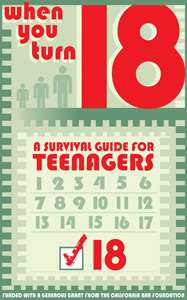State Bar revises
its guide for young adults
By Kristina Horton
Flaherty
Staff Writer
 Many young people
are still in high school when they turn 18. Many still live with their parents.
Many have never worked a full-time job. And many have no idea how dramatically
their rights and responsibilities — in the eyes of the law — have
just changed.
Many young people
are still in high school when they turn 18. Many still live with their parents.
Many have never worked a full-time job. And many have no idea how dramatically
their rights and responsibilities — in the eyes of the law — have
just changed.
A special State
Bar guide can give them a glimpse of what to expect in their transition to
young adulthood.
The newly revised
version of When You
Turn 18: A Survival Guide for Teenagers — to be released this
month with the start of the new school year — speaks directly to
teenagers on a wide variety of topics and laws that impact their lives.
“Turning 18
is an exciting milestone for many young people, but it also means that they
will face new — sometimes daunting — challenges, responsibilities
and consequences,” said State Bar President Bill Hebert. “This
guide can help demystify the legal system for them by providing relevant
information on such topics as renting an apartment, forming a legal contract,
serving on a jury and protecting one’s personal information from identity
theft.”
Last printed in
2008, the guide has become a popular handout and teaching tool in some high
school classrooms, special education programs, counseling sessions and
workshops.
Fr. Michael Brady,
the chaplain of Central Catholic High School in Modesto, uses the guide in
one-on-one counseling sessions to help seniors in their transition to young
adulthood. He has seen the look on their faces, he says, when they discover the
different consequences for their actions. The guide is a “very valuable
tool” that has made at least a few teens “make better
choices,” he wrote recently. “I believe it gives them a road map on
how to make better choices as their future is at stake.”
Some teachers and
school administrators across the state have used the guide to create games,
vocational day presentations, public speaking projects and even a
“scavenger hunt.” At one high school, teams of graduating seniors
compete in a power point game show based on the guide. In San Diego, a high
school history teacher had her students create a board game using information
pulled from the guide. In Garden Grove, teachers distribute the guide to high
school seniors studying “juvenile justice.” And in Mountain View,
Lakewood and Bakersfield, teams of high school students give class
presentations on sections pulled from the guide.
“Oftentimes,
students have a misconception about what it really means to turn 18,”
said Sylvia Juslin, who provides the guide to students at an alternative school
in Martinez. “For many students, it is a real eye opener.”
San Mateo special
education vocational specialist Jim Friedman, who recently retired, says the
guide has been “invaluable” in teaching his high school students
with mild to moderate disabilities. And in presentations for the school
district and at a special education state conference, Friedman has highlighted
ways to use it. In a workshop for government teachers, for example, he had the
participants create short plays that could be acted out by students and lead to
student discussion.
Broken into 19
topic areas, the 16-page, newspaper-style guide provides basic legal
information and answers to timely, relevant questions: Do I need my own car
insurance? What could happen if police catch me drinking alcohol at a party? Is
downloading information, pictures or music from the Internet ever against the
law? Is it safe to give out personal information online? What is sexting? Can
my boss legally monitor my emails and the websites that I visit while I’m
at work?
Partially funded
with a $50,000 grant from the California Bar Foundation, the guide is part of
an ongoing three-part series published by the State Bar. The other two guides
are Kids & and
the Law: An A-to-Z Guide for Parents, last published in 2010,
and Seniors &
the Law: A Guide for Maturing Californians, which will be updated in
2012. Roughly 10 million guides in a variety of languages have been distributed
since the series’ debut in 2001.
The revised
English version of When
You Turn 18 will be released in mid-September at the State Bar’s
annual meeting in Long Beach. A Spanish version will be available later this
year.
To order the guide
free of charge, send an email to 18@calbar.ca.gov.
Please specify the number of guides desired and include a complete mailing
address (p.o. boxes are not acceptable). There is no charge for the guide or
for shipping, nor is there a limit on how many can be ordered. However,
contributions are always welcome, especially for larger orders. If you do not
have access to the Internet, call 1-888-875-LAWS for instructions on ordering
the guide by mail.